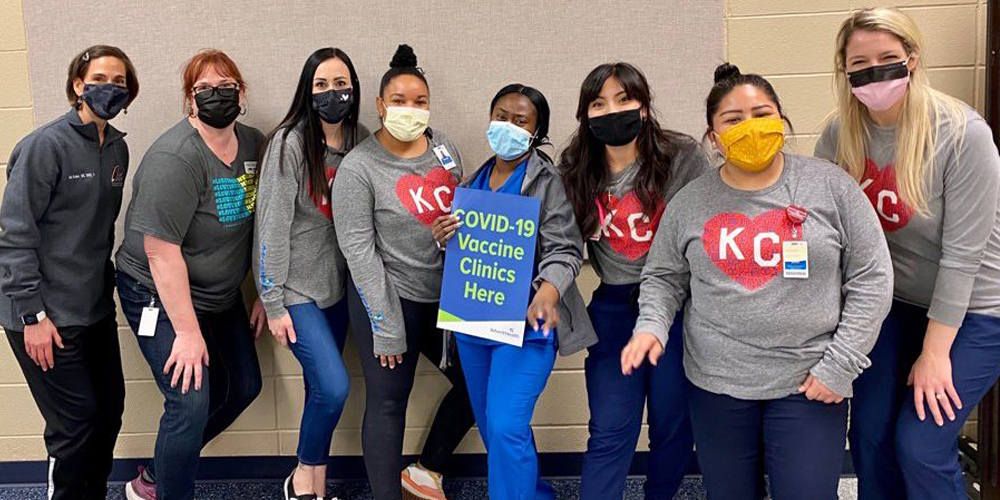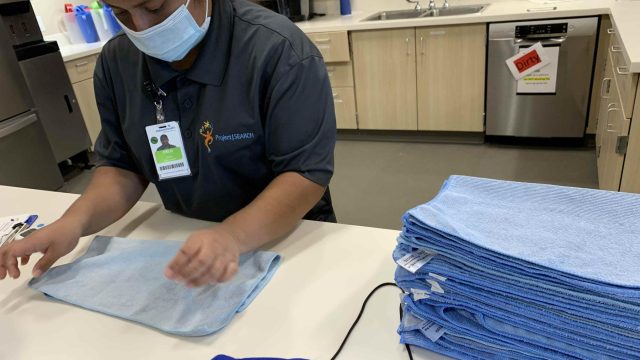Initiative boosts vaccination efforts for underserved people of color, Hispanics, and Blacks.

Vaccination clinics are important in providing access to the COVID-19 vaccine. Some people find it difficult to visit for reasons like language barriers, transportation issues, or specific medical needs.
Any of these issues can make it especially difficult for people in vulnerable populations to get the vaccine, Taylar Brown, manager of procurement and project delivery for AdventHealth Shawnee Mission, said. The Adventist health-care facilities are located in Kansas City, Kansas, United States.
“People of color, Hispanic and Black, and those with special medical needs are more at-risk for COVID complications,” Brown said. “It’s important to make sure they know the benefits of the vaccine and how to make an appointment.”
While Brown was visiting a vaccination clinic, she noticed the lack of diversity among people coming in to get their shots. She met with the AdventHealth leadership team to discuss expanding community outreach.
“We discussed ways to bring in people who might not otherwise have the opportunity,” she said. “AdventHealth provided resources including 500 doses of vaccines to set up clinics specifically for these vulnerable communities.”
In March 2021, Brown and her team set up clinics to bring vaccinations to diverse populations throughout Johnson County, Kansas. Brown worked with AdventHealth team members Christina Hiatt, information technology relationship manager; Sayree Chanvitayapongs, director of pharmacy; and Ashley Jones, nursing director of the mother/baby unit.
“Our mission was to bring the clinics to where patients would be comfortable,” Brown said. “That might mean planning a clinic where the volunteers could speak their language or having a clinic that could handle special needs patients.”
Along with community partners, including Church of the Resurrection, New Haven Seventh-day Adventist Church, and Ridgeview Elementary School, Brown and Hiatt reached out to community members to explain the importance of getting the vaccine. They made phone calls to hundreds of people, helping them schedule their appointments.
For the Hispanic community, clinics were held at El Centro in Olathe, which offers education, health-care resources, and advocacy for Latino community members. At the clinics, volunteers who could speak Spanish were on hand to help guide people through the process.
For special needs patients, clinics were held through AdventHealth’s Special Pediatric-to-Adult Need (SPAN) program. Led by Laura Gaffney, the program provides health-care services for those with Down syndrome, autism, cerebral palsy, and genetic disorders.
“We had great feedback from parents and caregivers about how grateful they were for that clinic,” Brown said. “The health-care team knew how to accommodate their needs and take extra time with each person, whether that meant singing with them or having stickers available.”
A confidential vaccination clinic was also held at Safehome, a women’s shelter in Johnson County for survivors of domestic abuse.
To help with the issue of transportation, Brown and her team worked with Johnson County government to provide drivers and cars to help people get to and from their clinic appointments.
Brown said that in total, they were able to make phone calls to 485 people from diverse communities and schedule them for a vaccine.
“We got so much positive feedback from the community,” she said. “They said we were able to vaccinate people who never thought that they would have access, including those who might need extra support or might be worried about issues like deportation. I’m so proud of the work by our team and to see how it made a difference in people’s lives.”
The original version of this story was posted by the Mid-America Union Conference Outlook.









